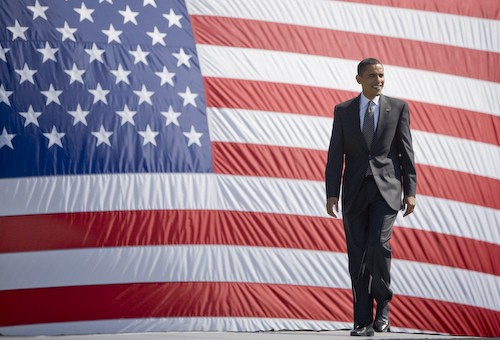Obama reacts to the outcry around NSA spying: What does it mean?
What Obama's commitments to privacy and transparency really mean
On Friday, U.S. President Barack Obama held a press conference to address public concerns over recent revelations of widespread communications surveillance.
As you may know, it was recently revealed that the U.S. National Security Agency (NSA) has been indiscriminately collecting law-abiding citizens’ personal data – a huge breach of privacy and trust. People have been livid over this abuse of surveillance powers, with over half-a-million Internet users speaking out against the NSA’s spying through the Stop Watching Us petition.
While Obama’s press conference is a sign of momentum—an acknowledgement of the public outcry, at the very least—and a milestone in the fight for communications privacy rights, it’s important to note that the U.S. President has still failed to make a clear commitment to stop the surveillance of law-abiding citizens in the U.S. and abroad.
Our friends at the U.S.-based Electronic Frontier Foundation (EFF) have come out with a great piece on the strengths and shortcomings of Obama’s talk—including the four commitments he made therein—which I’ll summarize below. You can also learn more by watching the video of the press conference here or reading the full transcripts here. And if you haven’t already, visit https://optin.stopwatching.us/ to make your voice heard.
Commitment #1: Patriot Act reform
First, for those who don’t know, the Patriot Act is a U.S. law created under President George W. Bush in 2001, one month after the September 11th attacks. Many have criticized the Act for removing civil liberties safeguards from law enforcement—allowing the FBI to warrantlessly search telephone, e-mail, and financial records, for example—which has clearly had long-lasting repercussions.
What Obama committed to: The U.S. President has said that he will “pursue appropriate reforms” to Section 215 of the Act – the subsection that is used to justify the bulk collection of telephone records.
What we still need: The EFF notes that Obama pointedly did not address Section 702 of the Patriot Act, which the government has also said supports broader surveillance, including the content of communications. The EFF also notes that Obama failed to explain what the above-mentioned “appropriate reforms” will actually be. Read more about what the EFF thinks should be in NSA reform legislation here.
Commitment #2: Bring more balance to the FISC
The Foreign Intelligence Surveillance Court (FISC) is the U.S. court that oversees requests for surveillance warrants, often made by the NSA and the FBI. The controversial order that Edward Snowden leaked to the media—the one that required Verizon to indiscriminately hand over its customers’ call records to the NSA—was one issued by the FISC.
What Obama committed to: Obama stated that he would create a public advocate that would stand up for privacy in the court.
What we still need: The EFF writes that this public advocate should be involved in every proceeding, not just "in appropriate cases." The group also emphasizes that in order to function, the advocate would need to be independent, and would need to have full access to any case materials presented to a FISC judge.
Commitment #3: Make more information public
What Obama committed to: Obama has directed the intelligence community “to make public as much information about these programs as possible.” According to the EFF, this includes the addition of a full-time civil liberties and privacy officer to the NSA, and the creation of a website that details its surveillance practices.
What we still need: The EFF notes that the promise of transparency around “these programs” must be a commitment to transparency around all surveillance programs – not just those that have already been leaked to the public.
Commitment #4: Introduce external review
What Obama committed to: The President has promised to create a “high level group of outside experts to review our entire intelligence and communications technologies.” The group will issue reports addressing the impact of surveillance technologies, including potential abuses and the impact on foreign policy.
What we still need: As the EFF writes, “any group of experts will struggle to have independence, adequate subpoena power, resources and staff time, as well as the political clout necessary to have a meaningful impact on our current surveillance regime.” We at OpenMedia join the EFF in hoping that Obama ensures this group gets the resources it needs to meaningfully do its job.
Again, we are very pleased to see that U.S. President Obama is reacting to the public outcry around the NSA’s expansive surveillance practices. But as the EFF writes, Obama may simply “be paying lip service to accountability and transparency”.
It’s important to note, however, that the President still hasn’t said that he would stop the NSA from spying on law-abiding citizens – this is the commitment we need most. As for the promises he did make, the EFF makes clear that “the devil will be in the details”.
It will be up to citizens to keep up the momentum, by making our voices so loud they can’t be ignored. Be sure to add your name to the Stop Watching Us petition today, and share it with everyone you know.


 Take action now!
Take action now!
 Sign up to be in the loop
Sign up to be in the loop
 Donate to support our work
Donate to support our work